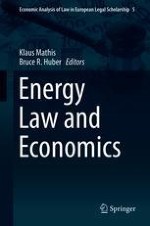2018 | OriginalPaper | Chapter
Intergenerational Choice Under Uncertainty: The Case of Future Energy Technologies—Legal and Economic Perspectives
Author : Stephan Meyer
Published in: Energy Law and Economics
Publisher: Springer International Publishing
Activate our intelligent search to find suitable subject content or patents.
Select sections of text to find matching patents with Artificial Intelligence. powered by
Select sections of text to find additional relevant content using AI-assisted search. powered by
